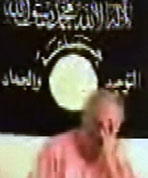I am Ken Bigley from Liverpool in the Walton district. I am here in Iraq and I think this is possibly my last chance to speak to someone who will listen from Europe. ... Mr Blair, I am nothing to you, it’s just one person in the whole of the United Kingdom that’s all. With a family like you’ve got a family, with children, like your children, your boys, your wife. Please you can help, I know you can. These people are not asking for the world, they’re asking for their wives and the mothers of their children.Full transcript.
He also has an 86-year old mother who collapsed a few days ago.

Blair finally responded publicly, with his own plea to the British public (he evidently had nothing to say to the kidnappers), against compassion (Bigley’s family must have known they were fucked when Blair praised their stoicism): “What these terrorists understand is that they can use and manipulate the modern media to gain enormous publicity for themselves and put democratic politics and politicians in a very difficult position.” Poor baby. Really, modern media and technology have made it so difficult to ignore suffering. So unfair.
Except that the mirror image (if I may mention older representational technology) of that is that, as Mary Riddell writes in the Observer, “When history is a string of macabre Kodak moments, those slaughtered off-camera evaporate as if they had never lived. ... On the day Ken Bigley’s video played in millions of British living rooms, 22 people were murdered in Baghdad.”
Similarly, on the day in April when those 4 mercenaries were killed in Fallujah, and their bodies burned and hung from a bridge, with pictures, several US soldiers were also killed, with little fuss. But the crispy critters pictures caused the US to mount another invasion attempt, evidently against the advice of the Marine general in charge of the area. And Rumsfeld ignored the torture at Abu Ghraib, explaining that he didn’t consider it important enough to inform Bush because “The problem at that point was one-dimensional. It wasn’t three-dimensional. It wasn’t photographs and video.” The “problem,” of course, was very much three-dimensional to the people involved.
Back in May I wrote about the Bushite obsession with images, “like the flight deck landing, the statue toppling and all the other carefully stage-managed moments, as if they’re constantly auditioning for a postage stamp. ... Bush, who is less fixated on words, for obvious reasons, thinks that once he has the right visual, he’s fixed in place the meaning of an event. Ironically, it was the two words Mission Accomplished that really turned Flight Suit Boy’s million-dollar photo op into a sick joke, and it was the photos of the prisoners that made torture into a live issue.”
No comments:
Post a Comment